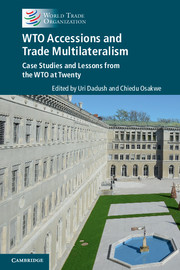Book contents
- Frontmatter
- Dedication
- Contents
- List of contributors
- Foreword
- Acknowledgements
- List of abbreviations
- Editors' note
- PART I WTO accessions, the trading system and the global economy
- PART II Overview: systemic outcomes from accessions
- PART III Members’ perspectives on accession negotiations
- PART IV Working party chairpersons’ perspectives on accession negotiations
- PART V Salient features inWTOAccession Protocols
- 29 Market access goods negotiations: salience, results and meaning
- 30 Services market opening: salience, results and meaning
- 31 WTO accession and the private sector: the nexus of rules and market opportunities
- 32 WTO accession and accession to the Agreement on Government Procurement: what is the relationship? Why should WTO acceding governments also consider GPA accession?
- 33 Energy-related rules in Accession Protocols: where are they?
- 34 Domestic framework for making and enforcing policies
- 35 Export duty commitments: the treaty dialogue and the pattern of commitments
- 36 Disciplining state trading practices: lessons from WTO accession negotiations
- 37 Intellectual property rights protection: the plus/minus debate from a least-developed country perspective – sense and nonsense
- 38 The future of multilateral investment rules in the WTO: contributions from WTO accession outcomes
- 39 Sanitary and phytosanitary measures: trends in accession plurilateral negotiations
- 40 Strengthening transparency in the multilateral trading system: the contribution of the WTO accession process
- PART VI Conclusion
- Annex: Contributor biographies
- Index
- Plate section
- References
31 - WTO accession and the private sector: the nexus of rules and market opportunities
from PART V - Salient features inWTOAccession Protocols
Published online by Cambridge University Press: 05 November 2015
- Frontmatter
- Dedication
- Contents
- List of contributors
- Foreword
- Acknowledgements
- List of abbreviations
- Editors' note
- PART I WTO accessions, the trading system and the global economy
- PART II Overview: systemic outcomes from accessions
- PART III Members’ perspectives on accession negotiations
- PART IV Working party chairpersons’ perspectives on accession negotiations
- PART V Salient features inWTOAccession Protocols
- 29 Market access goods negotiations: salience, results and meaning
- 30 Services market opening: salience, results and meaning
- 31 WTO accession and the private sector: the nexus of rules and market opportunities
- 32 WTO accession and accession to the Agreement on Government Procurement: what is the relationship? Why should WTO acceding governments also consider GPA accession?
- 33 Energy-related rules in Accession Protocols: where are they?
- 34 Domestic framework for making and enforcing policies
- 35 Export duty commitments: the treaty dialogue and the pattern of commitments
- 36 Disciplining state trading practices: lessons from WTO accession negotiations
- 37 Intellectual property rights protection: the plus/minus debate from a least-developed country perspective – sense and nonsense
- 38 The future of multilateral investment rules in the WTO: contributions from WTO accession outcomes
- 39 Sanitary and phytosanitary measures: trends in accession plurilateral negotiations
- 40 Strengthening transparency in the multilateral trading system: the contribution of the WTO accession process
- PART VI Conclusion
- Annex: Contributor biographies
- Index
- Plate section
- References
Summary
ABSTRACT
A country's bid for WTO membership can promote a feeling of challenge and uncertainty among members of the private sector as the long-established methods of conducting business are susceptible to undergoing considerable change. In order to overcome the potential resistance to this change, acceding governments have responded to the concerns of their businesses by adopting strategies to raise awareness of the long-term benefits of reform during the negotiating period. In this chapter we document some of the benefits related to trade and investment for Article XII members that have undertaken awareness raising strategies and necessary reforms during their accession processes. This chapter underlines that accession commitments, which are critical to bringing about domestic policy and regulatory reforms, need to be implemented in the right spirit to develop business competitiveness in the long run.
WTO accession offers predictability of new market opportunities to acceding governments while requiring the implementation of a number of rules and agreements. This process can conjure up fears in the private sector as it may anticipate increased competition, a shift away from established systems of doing business and threats, especially to long-standing vested interests. After all, membership entails a range of legally binding policy changes and commitments requiring considerable efforts from acceding governments. As the private sector encounters short-term challenges stemming from more competition, acceding governments have responded by allaying the apprehensions of their businesses by raising awareness of the long-term benefits of reform well in advance during the negotiation period and making provisions for assisting businesses to operate within the new paradigm.
WTO members cover more than 97 per cent of world trade. Hence, integration into this nearly universal community acts as a strong incentive for membership. The true benefits of WTO accession have, however, been subject to numerous debates in the academic world relating to the costs and benefits of accession. As illustrated by recent cases, with sufficient preparation, including a carefully drafted plan, awareness-raising for stakeholders and preparation for adjustment, the long-term benefits and improved business environment with increased predictability of market access and binding rules outweigh the short-term costs of the negotiation process and the reforms that follow.
- Type
- Chapter
- Information
- WTO Accessions and Trade MultilateralismCase Studies and Lessons from the WTO at Twenty, pp. 664 - 673Publisher: Cambridge University PressPrint publication year: 2015



